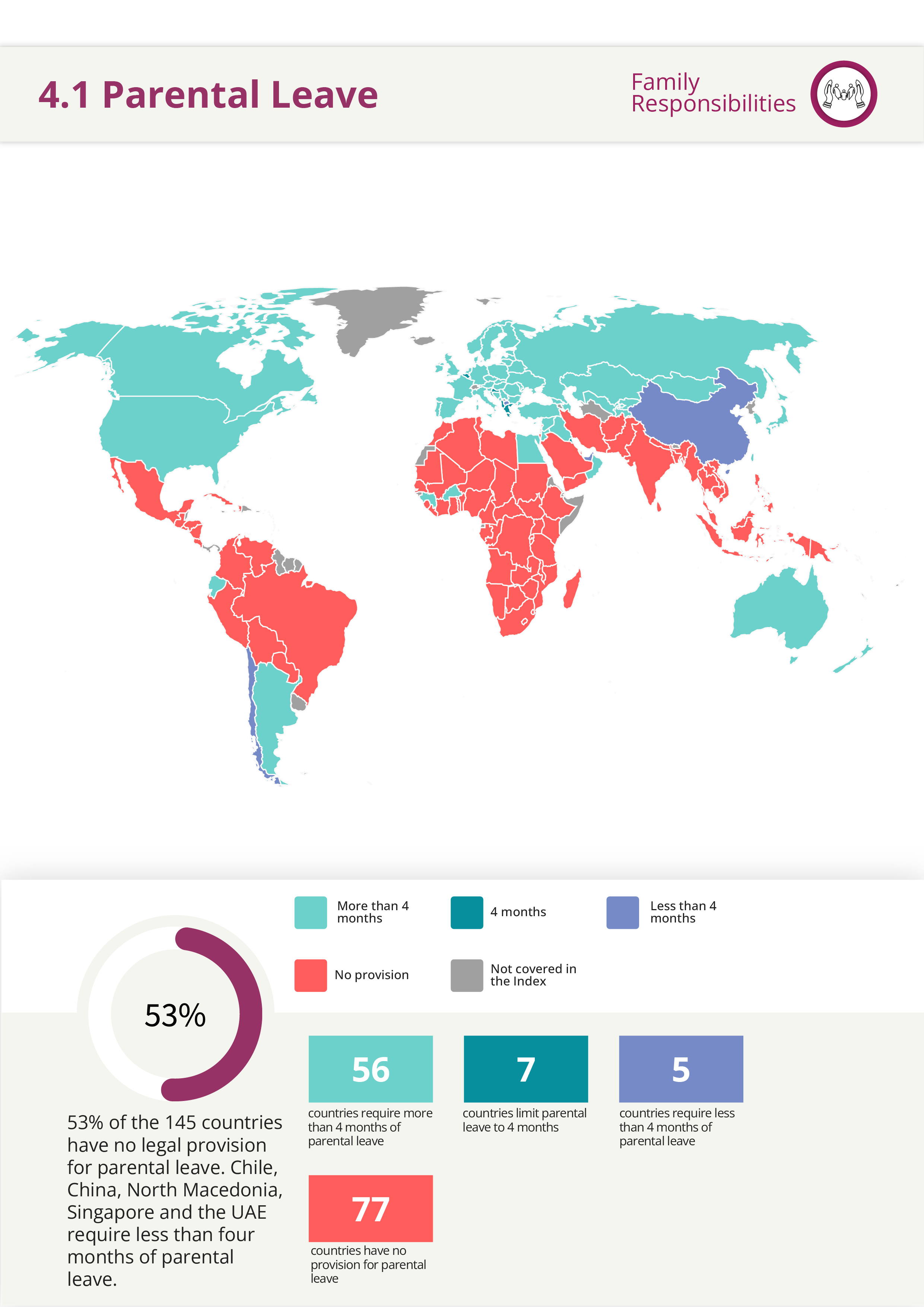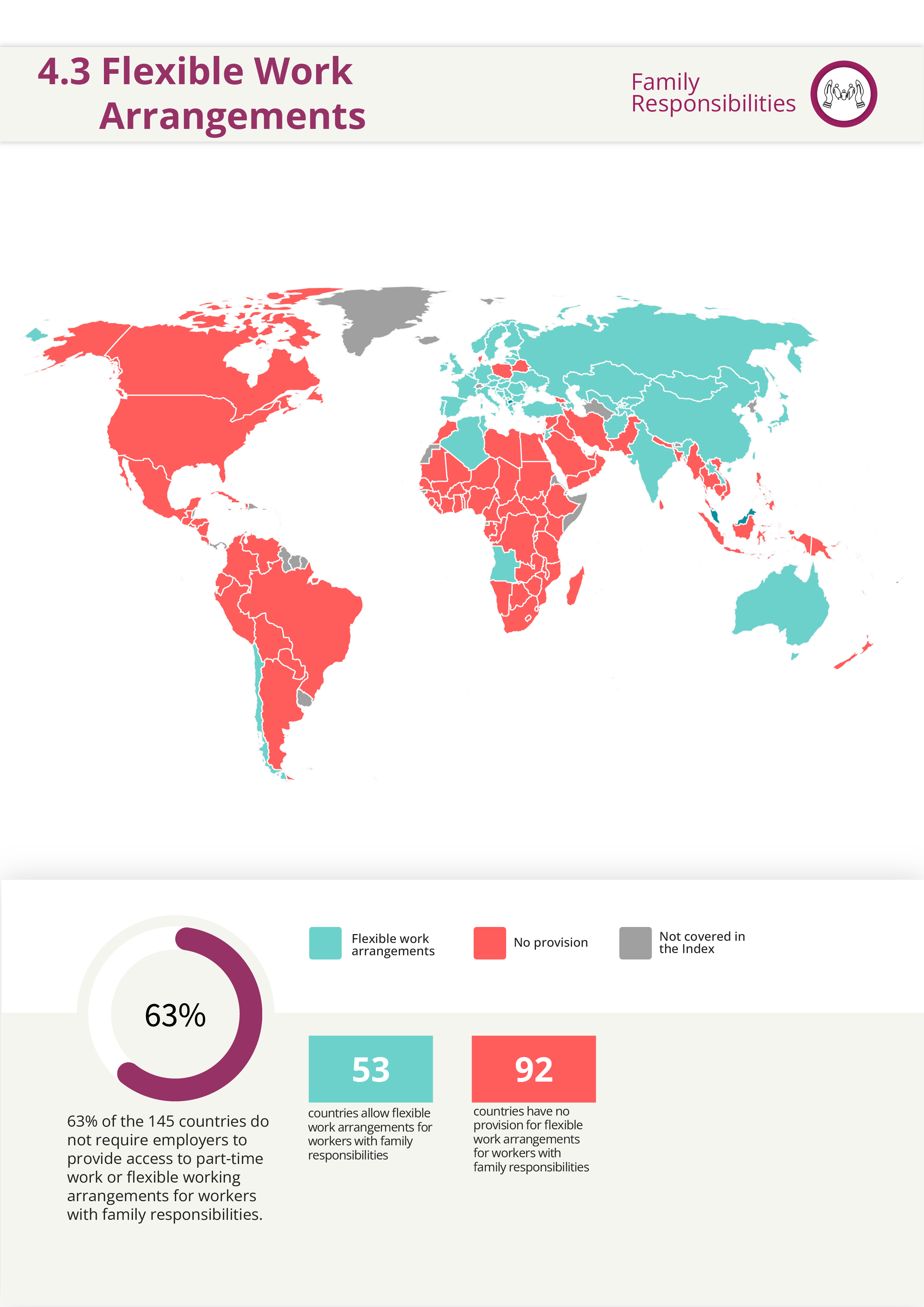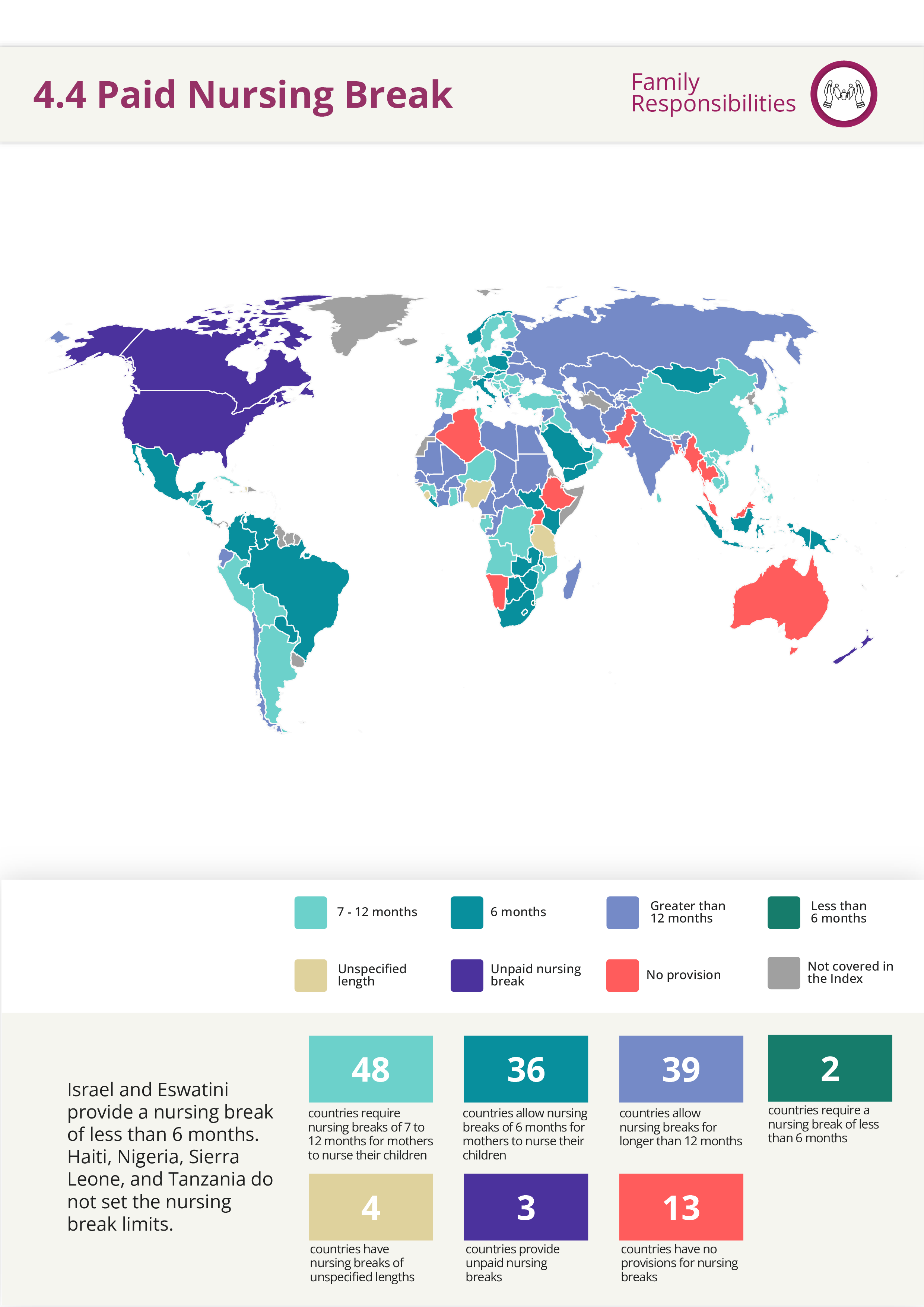Family responsibilities are responsibilities in relation to dependent children and other immediate family members who need care (sick, elderly, infirm). The Family Responsibilities indicator measures whether labour legislation ensures that workers get paternity leave, parental leave and flexible work options while tending to their family responsibilities. The indicator also analyses labour legislation on the provision of nursing breaks.
4.1 Parental Leave
Does the law require a four-month parental leave for parents?
International Regulatory Standard
- Family Responsibilities Recommendation, 1981 (No. 165
- Maternity Protection Recommendation, 2000 (No. 191)
Paragraph 22 of the ILO’s Workers with Family Responsibilities Recommendation, 1981 (No. 165) and Paragraph 10 of the ILO’s Maternity Protection Recommendation, 2000 (No. 191) insist that either parent should have the possibility, within a period immediately following maternity leave, of obtaining leave of absence (parental leave), without relinquishing employment and with rights resulting from employment being safeguarded. The parental leave period, its length, as well as payment of parental benefits and the use and distribution of parental leave between employed parents, should be determined by national laws or regulations or in any manner consistent with the national practice.
Scoring Methodology
Whether parental leave is available to parents:
1: Workers have the right to paid or unpaid parental leave of at least four months on exhaustion of maternity and paternity leave.
0: Labour legislation does not provide for the right to paid or unpaid parental leave of four months on exhaustion of maternity and paternity leave.*
*Taking into account the fact that the first six months are vital for the healthy development of a child (UNICEF, 2019), the Labour Rights Index considers four-month parental leave along with compulsory post-natal maternity leave of 6 weeks. It is just 18 days short of 180 days!

4.2 Paternity Leave
Does the law require at least one week of paid paternity leave for fathers*?
International Regulatory Standard
- 2009 ILC Resolution Concerning Gender Equality at the Heart of Decent Work
- Quality Apprenticeships Recommendation, 2023 (No. 208)
In line with para 42 of the 2009 ILC** Resolution Concerning Gender Equality at the Heart of Decent Work, Governments must develop, together with social partners, adequate policies for a better balance of work and family responsibilities for an equal sharing of these responsibilities. Other than parental leave, such policies should include paternity leave, with incentives for men to use such leaves.
The only international labour standard which clearly refers to paternity leave is the ILO’s Quality Apprenticeships Recommendation, 2023 (No. 208) which states that Members should take measures to ensure that apprentices have access to paid maternity or paternity leave and parental leave.
Scoring Methodology
Whether fathers have the right to take paid paternity leave on the birth of a child:
1: Labour legislation requires employers to grant paid paternity leave of at least one week on the birth of a child. Paternity leave might be an employer liability or paid by the social security system (social insurance or general tax financing).
0: There is no provision for paid paternity leave of at least one week.
* “or, where and insofar as recognised by national law, equivalent second parents”
** ILC refers to the International Labour Conference. Generally referred to as the international parliament of labour, the annual Conference sets the international labour standards and the broad policies of the ILO.

4.3 Flexible Work Arrangements
Does the law require flexible working arrangements* for workers with family responsibilities?
International Regulatory Standard
- Workers with Family Responsibilities Recommendation, 1981 (No. 165)
- Part-Time Work Convention, 1994 (No. 175)
Paragraph 18 of the ILO’s Workers with Family Responsibilities Recommendation, 1981 (No. 165) suggests that particular attention should be given to general measures for improving working conditions and the quality of working life. This includes measures aimed at progressive reduction of daily hours of work and of overtime, and more flexible arrangements as regards working schedules, rest periods and holidays, taking into account the stage of development and the particular needs of the country and of different sectors of activity.
Article 9(2) of the ILO’s Part-Time Work Convention, 1994 (No. 175) requires member states to take measures in order to facilitate access to productive and freely chosen part-time work which meets the needs of both employers and workers. Such measures should include the review of laws and regulations that may prevent or discourage recourse to or acceptance of part-time work. In employment policies, special attention must be given to the needs and preferences of specific groups such as the unemployed, workers with family responsibilities, older workers, workers with disabilities and workers undergoing education or training.
Scoring Methodology
Whether flexible working arrangements are available to workers with family responsibilities:
1: The labour legislation allows flexible work arrangements for workers with family responsibilities.
0: The labour legislation does not provide access to part-time work or flexible work for workers with family responsibilities.
* “flexible working arrangements” means the possibility for workers to adjust their working patterns, including through the use of remote working arrangements, flexible working schedules, or reduced working hours

4.4 Paid Nursing Breaks
Does the law require paid nursing breaks?
International Regulatory Standard
- Maternity Protection Convention, 2000 (No. 183)
- Maternity Protection Recommendation, 2000 (No. 191)
Article 10 of the ILO’s Maternity Protection Convention, 2000 (No. 183) requires that a woman worker must be given the right to one or more daily breaks or a daily reduction of hours of work to breastfeed her child. The period during which nursing breaks or the reduction of daily hours of work are allowed, their number, the duration of nursing breaks and the procedures for reducing daily hours of work shall be determined by national law and practice. These breaks or the reduction of daily work hours shall be counted as working time and remunerated accordingly. Paragraph 7 of the ILO’s Maternity Protection Recommendation, 2000 (No. 191) further states that based on medical certificates, the frequency and length of nursing breaks should be adapted to the particular needs of workers.
Scoring Methodology
Whether there are paid nursing breaks:
1: The labour legislation requires the provision of paid nursing breaks until the infant is six months old. These nursing breaks can either be during the working day or take the form of reduced working hours.
0: Labour legislation does not require employers to grant fully paid nursing breaks to workers until the infant is six months old.

Family Responsibilities - comparative tables
Parental Leave
| Region | < 4 months | 4 months | > 4 months | No Provision | Covered Countries |
| Africa | Burkina Faso, Egypt, Guinea | Algeria, Angola, Benin, Botswana, Burundi, Cabo Verde, Cameroon, Central African Republic, Chad, Congo, Côte D'Ivoire, Democratic Republic of the Congo, Eswatini, Ethiopia, Gabon, Gambia, Ghana, Kenya, Lesotho, Liberia, Libya, Madagascar, Malawi, Mali, Mauritania, Morocco, Mozambique, Namibia, Niger, Nigeria, Rwanda, Senegal, Sierra Leone, South Africa, South Sudan, Sudan, Togo, Tunisia, Uganda, United Republic of Tanzania, Zambia, Zimbabwe | 45 | ||
| Americas | Chile | Argentina, Canada, Ecuador, United States of America | Bolivia, Brazil, Colombia, Costa Rica, Cuba, El Salvador, Guatemala, Haiti, Honduras, Mexico, Nicaragua, Paraguay, Peru, Venezuela | 19 | |
| Asia | China, Singapore, United Arab Emirates | Kuwait | Azerbaijan, Bahrain, Iraq, Japan, Jordan, Kazakhstan, Kyrgyz Republic, Mongolia, Oman, Republic of Korea, Syria, Taiwan , Tajikistan, Uzbekistan | Afghanistan, Bangladesh, Cambodia, India, Indonesia, Iran, Israel, Lao People's Democratic Republic, Lebanon, Malaysia, Myanmar, Nepal, Pakistan, Philippines, Qatar, Saudi Arabia, Sri Lanka, Thailand, Viet Nam, Yemen | 38 |
| Europe | North Macedonia | Albania, Belgium, Croatia, Greece, Luxembourg, Malta | Austria, Belarus, Bosnia and Herzegovina, Bulgaria, Cyprus, Czechia, Denmark, Estonia, Finland, France, Georgia, Germany, Hungary, Ireland, Italy, Latvia, Lithuania, Moldova, Montenegro, Netherlands, Norway, Poland, Portugal, Romania, Russian Federation, Serbia, Slovakia, Slovenia, Spain, Sweden, Türkiye, Ukraine, United Kingdom | 40 | |
| Oceania | Australia, New Zealand | Papua New Guinea | 3 | ||
| Total Countries | 5 | 7 | 56 | 77 | 145 |
Paternity Leave
| Region | < 7 days | 7 days | > 7 days | Conditional leave | No Provision | Unpaid leave | Covered Countries |
| Africa | Algeria, Angola, Benin, Burkina Faso, Burundi, Cameroon, Central African Republic, Chad, Congo, Côte D'Ivoire, Democratic Republic of the Congo, Ethiopia, Gabon, Mali, Mauritania, Morocco, Niger, Senegal, Togo, Tunisia, Uganda, United Republic of Tanzania | Liberia, Mozambique, Rwanda | Cabo Verde, Gambia, Kenya, Malawi, Sierra Leone, South Africa, South Sudan, Zimbabwe | Botswana, Egypt, Eswatini, Ghana, Guinea, Lesotho, Libya, Madagascar, Namibia, Nigeria, Sudan | Zambia | 45 | |
| Americas | Argentina, Bolivia, El Salvador, Guatemala | Brazil, Chile, Mexico, Nicaragua | Canada, Colombia, Costa Rica, Ecuador, Paraguay, Peru, United States of America, Venezuela | Cuba, Haiti, Honduras | 19 | ||
| Asia | Bahrain, Indonesia, Jordan, Kazakhstan, Lao People's Democratic Republic, Saudi Arabia | Malaysia, Oman, Pakistan, Taiwan, Viet Nam | Afghanistan, China, Iran, Mongolia, Myanmar, Nepal, Philippines, Republic of Korea, Singapore | Cambodia, Israel, Lebanon | Bangladesh, India, Iraq, Japan, Kuwait, Kyrgyz Republic, Qatar, Sri Lanka, Syria, Thailand, United Arab Emirates, Uzbekistan, Yemen | Azerbaijan, Tajikistan | 38 |
| Europe | Albania, North Macedonia | Serbia Türkiye | Austria, Belgium, Bosnia and Herzegovina, Bulgaria, Croatia, Cyprus, Czechia, Denmark, Estonia, Finland, France, Greece, Hungary, Ireland, Italy, Latvia, Lithuania, Luxembourg, Malta, Moldova, Netherlands, Norway, Poland, Portugal, Romania, Slovakia, Slovenia, Spain, Sweden, Ukraine, United Kingdom | Georgia, Germany, Montenegro | Belarus, Russian Federation | 40 | |
| Oceania | Australia | Papua New Guinea | New Zealand | 3 | |||
| Total Countries | 34 | 14 | 57 | 3 | 31 | 6 | 145 |
Flexible Work Arrangements
| Region | Flexible Work Arrangements | No Provision | Covered Countries |
| Africa | Algeria, Angola, Tunisia | Benin, Botswana, Burkina Faso, Burundi, Cabo Verde, Cameroon, Central African Republic, Chad, Congo, Côte D'Ivoire, Democratic Republic of the Congo, Egypt, Eswatini, Ethiopia, Gabon, Gambia, Ghana, Guinea, Kenya, Lesotho, Liberia, Libya, Madagascar, Malawi, Mali, Mauritania, Morocco, Mozambique, Namibia, Niger, Nigeria, Rwanda, Senegal, Sierra Leone, South Africa, South Sudan, Sudan, Togo, Uganda, United Republic of Tanzania, Zambia, Zimbabwe | 45 |
| Americas | Chile | Argentina, Bolivia, Brazil, Canada, Colombia, Costa Rica, Cuba, Ecuador, El Salvador, Guatemala, Haiti, Honduras, Mexico, Nicaragua, Paraguay, Peru, United States of America, Venezuela | 19 |
| Asia | Afghanistan, Azerbaijan, China, India, Japan, Jordan, Kazakhstan, Kyrgyz Republic, Lao People's Democratic Republic, Mongolia, Republic of Korea, Taiwan , Tajikistan, Uzbekistan | Bahrain, Bangladesh, Cambodia, Indonesia, Iran, Iraq, Israel, Kuwait, Lebanon, Malaysia, Myanmar, Nepal, Oman, Pakistan, Philippines, Qatar, Saudi Arabia, Singapore, Sri Lanka, Syria, Thailand, United Arab Emirates, Viet Nam, Yemen | 38 |
| Europe | Albania, Austria, Belgium, Bosnia and Herzegovina, Bulgaria, Croatia, Czechia, Estonia, Finland, France, Germany, Greece, Hungary, Ireland, Italy, Latvia, Lithuania, Luxembourg, Malta, Moldova, Montenegro, Netherlands, Norway, Portugal, Romania, Russian Federation, Serbia, Slovakia, Slovenia, Spain, Sweden, Türkiye, Ukraine, United Kingdom | Belarus, Cyprus, Denmark, Georgia, North Macedonia, Poland | 40 |
| Oceania | Australia | New Zealand, Papua New Guinea | 3 |
| Total Countries | 53 | 92 | 145 |
Paid Nursing Breaks
| Region | < 6 months | 6 months | 7-12 months | > 12 months | Unpaid | Unspecified length | No Provision | Covered Countries |
| Africa | Eswatini | Botswana, Burundi, Cabo Verde, Kenya, Lesotho, Liberia, Malawi, South Africa, South Sudan, Zambia, Zimbabwe | Angola, Democratic Republic of the Congo, Gabon, Ghana, Guinea, Mozambique, Niger, Rwanda, Tunisia | Benin, Burkina Faso, Cameroon, Central African Republic, Chad, Congo, Côte D'Ivoire, Egypt, Gambia, Libya, Madagascar, Mali, Mauritania, Morocco, Senegal, Sudan, Togo | Nigeria, Sierra Leone, United Republic of Tanzania | Algeria, Ethiopia, Namibia, Uganda | 45 | |
| Americas | Brazil, Colombia, Costa Rica, El Salvador, Honduras, Mexico, Nicaragua, Paraguay, Venezuela | Argentina, Bolivia, Cuba, Guatemala, Peru | Chile, Ecuador | Canada, United Sates of America | Haiti | Bangladesh, Lebanon, Malaysia, Myanmar, Pakistan, Singapore, Thailand | 19 | |
| Asia | Israel | Bahrain, Indonesia, Mongolia, Saudi Arabia, United Arab Emirates, Yemen | Cambodia, China, Iraq, Japan, Jordan, Lao People's Democratic Republic, Oman, Philippines, Qatar, Republic of Korea, Sri Lanka, Viet Nam | Afghanistan, Azerbaijan, India, Iran, Kazakhstan, Kuwait, Kyrgyz Republic, Nepal, Syria, Taiwan , Tajikistan, Uzbekistan | Malta | 38 | ||
| Europe | Albania, Austria, Ireland, Italy, Lithuania, Luxembourg, Norway, Poland, Slovakia | Belgium, Bosnia and Herzegovina, Bulgaria, Croatia, Cyprus, Czechia, Denmark, Finland, France, Georgia, Germany, Hungary, Montenegro, Netherlands, North Macedonia, Portugal, Romania, Serbia, Spain, Sweden, Türkiye, United Kingdom | Belarus, Estonia, Greece, Latvia, Moldova, Russian Federation, Slovenia, Ukraine | 40 | ||||
| Oceania | Papua New Guinea | New Zealand | Australia | 3 | ||||
| Total Countries | 2 | 36 | 48 | 39 | 3 | 4 | 13 | 145 |
Family Responsibilities - country score snapshot

